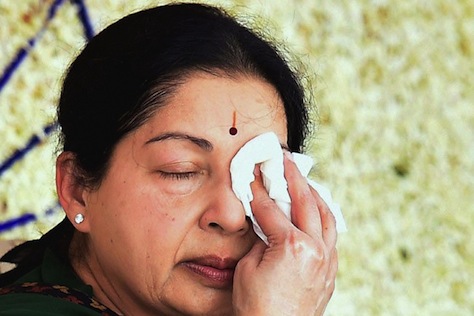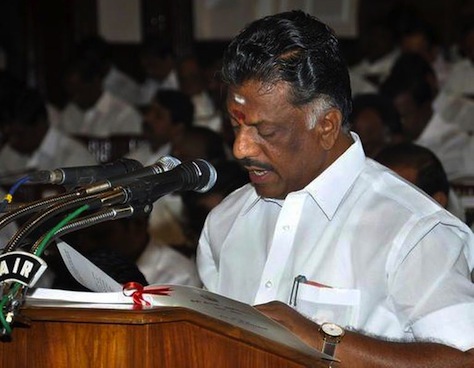 Photo credit to Malayalam Daily News.
Photo credit to Malayalam Daily News.
It says something about the strength of India’s democracy that a regional leader who controls the third-largest bloc of MPs in the Lok Sabha (लोक सभा), the lower house of the Indian parliament, and who has developed something of a personality cult as chief minister of her home state of Tamil Nadu, can fall from power broker to convicted felon in the blink of an eye.![]()
So it goes for Jayalalithaa (pictured above), a former star of Tamil cinema, who has towered over Tamil Nadu’s politics for the past three decades — she first served as chief minister from 1991 to 1996, again for four months in 2001, from 2002 to 2006 and, most recently, since May 2011 regional elections, when her party, the AIADMK (All India Anna Dravida Munnetra Kazhagam) won a landslide victory. She is known throughout the state as Amma, a Tamil word for ‘mother.’
With over 72 million people, Tamil Nadu is the sixth-most populous in India, and it has a population equivalent to Turkey’s. Its Tamil-speaking population also makes it unique among India’s states as a key cultural link with Sri Lanka, the island nation to India’s southeast.
In the most recent national elections in April and May 2014, her party won 37 out of 39 constituencies in the state of Tamil Nadu, a rare performance in withstanding the electoral wave that brought prime minister Narendra Modi’s Hindu nationalist Bharatiya Janata Party (the BJP, भारतीय जनता पार्टी) its biggest mandate, by far in Indian history.
But on Saturday, Jayalalithaa’s luck ran out when a Karnataka-based court sentenced her to a four-year jail term in a corruption case that resulted, suddenly, in her demotion from office. The court found Jayalalithaa guilty in a ‘disproportionate assets’ case, essentially convicting her for illegally obtaining up to 530 million rupees (around $8.7 million) in unexplained income. That forced her to step down immediately as chief minister and report to prison, though she’ll have an opportunity to appeal the verdict.
She is now the first sitting chief minister to be found guilty of corruption charges.
* * * * *
RELATED: Jayalalithaa, the Tamil actress-turned-strongwoman,
could play India’s kingmaker
* * * * *
If the conviction holds, it will be a rare victory for anti-corruption reformers in India. Among the strongest regional politicians, few are as powerful or as popular as Jayalalithaa. That give the case national importance. If the Indian judiciary can hold to account someone like Jayalalithaa, whose face plasters billboards, subsidized food halls and even bottled water in Tamil Nadu, no one in India can credibly believe that she (or he) is above the law. It’s a powerful precedent, and it’s a sign to global investors of the growing strength of Indian legal institutions.
It’s not the first time Jayalalithaa has been barred from office.
After she was convicted of criminal offenses also related to corruption charges, the Supreme Court of India ruled that she could not hold office in September 2001, despite her party’s victory in state elections four months earlier. The Supreme Court, however, relented when the lower court acquitted her on some of the related charges, allowing her to return to office in March 2002.
Her finance minister, O. Panneerselvam (pictured above), who ran Tamil Nadu’s government between September 2001 and March 2002, will do so again now, and he was sworn in on Sunday as Tamil Nadu’s new chief minister.
Though he’s widely regarded as a faithful loyalist who will serve as a placeholder for Jayalalithaa, there’s a chance that her hiatus from politics could be much longer this time around. If the conviction is not overturned, the 66-year-old Jayalalithaa will be subject to an additional six-year ban on holding political office. That effectively means she could be sitting on the sidelines of Tami Nadu and Indian politics for the next decade.
The case stems from her first stint in office, between 1991 and 1996, when opponents argued that her net worth jumped from 30 million rupees to 660 million rupees over the course of her government.
The ruling could also have a national impact in political terms.
Had Modi’s victory not been so sweeping in May, he could have been forced into an uncomfortable alliance with the AIADMK, tarring Modi and the BJP with the kind of corruption for which both major Dravidian parties have long been known. With 37 seats in the Lok Sabha, Jayalalithaa has alternatively hoped to build a leftist and regional-based ‘third front’ against both the BJP and its national rival, the Indian National Congress (Congress, भारतीय राष्ट्रीय कांग्रेस).
Instead, Modi and the BJP now have an opportunity to build support before the next regional elections in a state that hasn’t, so far, warmed to the BJP. Though the BJP won control of the state government in Karnataka, briefly, it has so far been shut out of south India. Winning control of Tamil Nadu’s government in 2016 (or even sooner) would demonstrate that the BJP can compete throughout all of south India, especially at a time when Congress is suffering the aftershocks of its worst electoral performance since India’s independence.
For now, Jayalalithaa’s conviction will not harm the AIADMK, because it controls 203 out of 234 seats in the state’s legislative assembly and will likely under Panneerselvam’s hand through 2016. Moreover, the conviction might even inspire a backlash of sympathy among Jayalalithaa’s supporters, who could believe that she has been unfairly singled out in a country where corruption is rife. Her latest stint in office is marked by a relatively robust effort to provide food, clean water and other essentials to the state’s poorest residents.
Furthermore, the AIADMK’s regional rival, the DMK (Dravida Munnetra Kazhagam, திராவிட முன்னேற்றக் கழகம், Dravidian Progress Federation) may not benefit much from Jayalalithaa’s downfall. The DMK, like the AIADMK a Dravidian regional party, today politically decimated after 2011 regional elections, when it lost all but 31 seats in the state legislative assembly, and the 2014 Lok Sabha elections, when it lost all 18 of its national MPs.
The DMK’s leader, the 90-year-old Karunanidhi, who first served as chief minister in 1969, has an even longer record of corruption, illegality and nepotism, though he will run for chief minister again in 2016. Moreover, it was a DMK legislator, Andimuthu Raja, who was serving as communications minister in the Congress-led government between 2007 and 2009, when the 2G spectrum scandal took place. It’s perhaps the most audacious graft case in Indian history, as officials under Raja’s watch undercharged telecommunications firms for spectrum allocation and pocketed the difference, which amounted to billions of dollars in illegal bribes.
All of which makes 2016 a perfect opportunity for Modi’s BJP to redraw the boundaries of Indian politics.
Jayalalithaa may, after all, play a role in India’s changing political tectonics. Just not in the way that she envisioned.

